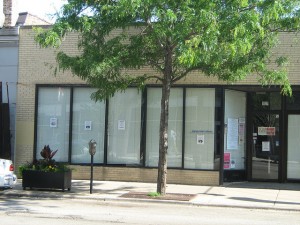Community archives at a moment of change
25 May 2012 – Anne Parsons
Nearly thirty years ago, a small collective of twenty- and thirty-something LGBT activists in Chicago founded the Gerber/Hart Library and Archives. Active in the Gay Liberation movement and other social protest movements of the 1960s and 1970s, these grassroots historians collected LGBT materials and reclaimed the past as part of the production of a proud political identity. In this way, the founders of Gerber/Hart reflected a broader movement within marginalized communities to establish democratic archival collectives in order to claim authority over their historical narratives and material heritage.
Thirty years later, the collections at Gerber/Hart have fallen into such disarray that researchers report that the library cannot even provide a list of its collections. In response to this organizational deterioration and other changes in transparency, a group of Gerber/Hart members recently called for a meeting in which the organization’s membership could vote for new leadership. In response, the three-person board at Gerber/Hart unilaterally drafted and issued new rules governing the organization, straying far from the original democratic spirit of the organization. The new bylaws stripped Gerber/Hart members of their right to vote and eject rogue board members. At this point legal action is imminent, but until then the collections remain mismanaged and inaccessible to LGBT and research communities.
All archives have a fundamental responsibility to preserve and make their collections accessible to the public. Community-based archives like Gerber/Hart command a special level of trust from LGBT people who deposit their collections with them. Mainstream cultural organizations have historically mishandled the cultural assets of this community by closeting same-sex loving practices and erasing gender non-conformity. While mainstream repositories have begun to correct such misrepresentations in the last few decades, LGBT archives still play an important role in preserving queer history. The mismanagement of cultural resources is an injustice in any context, but it causes particular damage when done under the purview of grassroots organization, serving to reproduce the cultural silencing against which the Gerber/Hart’s founders fought.
Outrage at Gerber/Hart’s practices has catalyzed scholars and community members to reclaim Gerber/Hart and imagine a new future for the community’s archives. This moment also corresponds with a generational shift, as the organization is now thirty years old. There is opportunity to revive the younger generation’s interest in the past by including them in building a new LGBT community archives, whether at Gerber/Hart or elsewhere. As community members work to reclaim their cultural heritage, there is new possibility to work with younger community activists and LGBT scholars to envision a new future. Such collaboration would not only lay the foundation for strong future leadership, but also promote the inter-generational conversations that are more broadly needed within the community.
This current moment of change is not limited to Gerber/Hart and LGBT community preservation; it is also present in community history projects of all types that came out of social movements in the 1960s and 1970s. Nearly half a century ago, African American, Native American, feminist, LGBT and many other communities started history projects in order to effect social change. Now, as the leadership of that generation passes the torch to the next, there is the opportunity to revive the spirit of democratic practice, activism and community building so central to the original vision of these places.
~ Lara Kelland and Anne Parsons
Lara is a PhD Candidate at the University of Illinois at Chicago (UIC). She writes on the founding of Gerber/Hart Library in her dissertation, “Clio’s Foot Soldiers: Twentieth-Century U.S. Social Movements and the Uses of Collective Memory.” Anne also studies at UIC, where she studies the history of confinement in America, public history and gender & women’s studies. She has researched LGBT history in Chicago for the exhibition “Out in Chicago.” Both Anne and Lara have previously volunteered with the organization.





